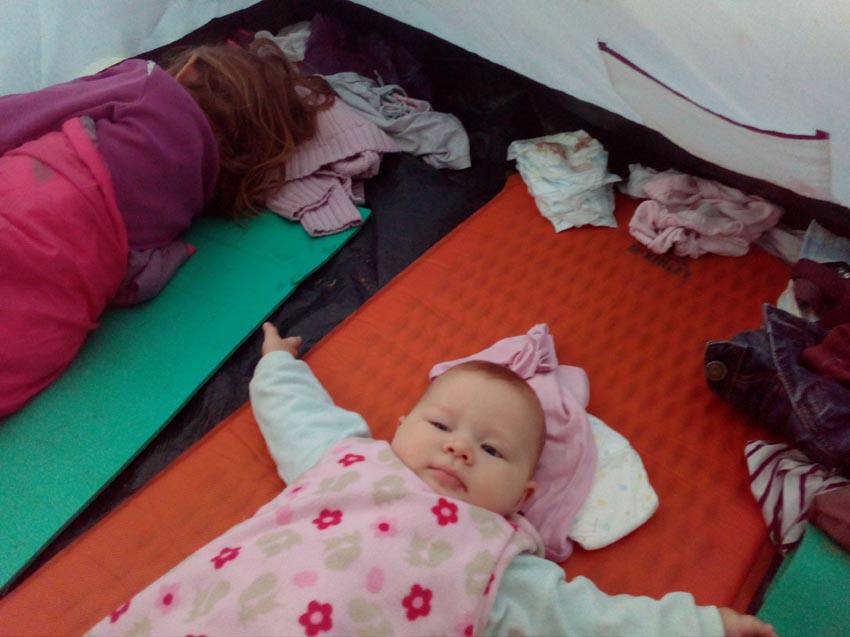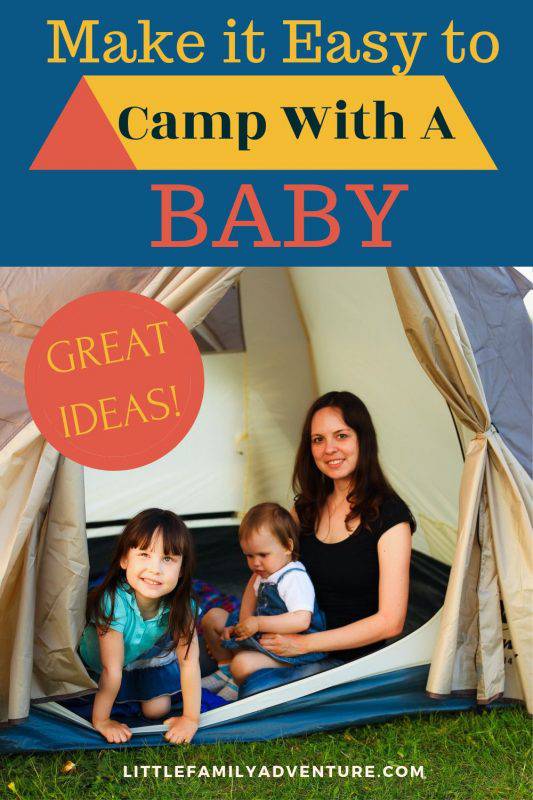There are a lot of good reasons to go camping with a baby. Outdoor play is important for a baby’s development. Even things as simple as touching grass or dirt help stimulate mental growth.

Camping can also be great for physical health. Children who go outdoors from a young age are less likely to develop allergies and have stronger immune systems. Research even shows that time outdoors encourages better sleep habits in babies!
This article contains affiliate links. We earn from qualifying purchases.
On top of that, camping is an affordable family vacation option – and every penny matters when you’ve got the expenses that come with a baby.

But let’s be realistic here. Despite all those happy Instagram photos you see, camping with a baby can be a challenge. If you don’t have realistic expectations or plan the trip well, it can be a miserable experience.
Camping with an Infant
Here are some tips for camping with a baby that will ensure you actually have a good experience.
1. Know What to Expect For Each Age Range
The term “baby” can refer to a newborn, infant, or even toddler. Obviously, there is a big difference in camping with a newborn and toddler. Heck, there’s a big difference when camping with a 4-month old versus a 6-month old!
It’s important to be aware of the different challenges you’ll have camping with a baby at each age range. When you know what to expect, you can take steps to plan ahead and be ready for them.
Birth to 6 months:
- Constant stops for feeding
- Multiple nighttime wakings – Which can be tricky in a tent
- Warming and sterilizing bottles and mixing baby formula over a camp stove (if you aren’t breastfeeding)
- Exhausted parents – And mom is possibly still recovering physically or mentally from childbirth

6-9 months:
- Need to pack solid foods – Serenity Foods offers a great selection of whole food purees in convenient pouches which are ideal for camping.
- Baby puts everything in their mouth – Including rocks, sticks, acorns and other choking hazards
- Rolling over – Means you need a safe place to put your baby outdoors
10+ months:
- Crawling and walking – Have to keep a constant eye on your baby so she doesn’t get lost or injured
- Separation anxiety and tantrums – Like when mom goes to filter water and baby starts screaming uncontrollably
- Plays games – But loses interest quickly, so you have to constantly entertain your baby
- Heavier weight – Even with a good infant carrier, it’s still going to be hard to carry her on long hikes
- Only takes 1-2 naps per day – Meaning less downtime for you
In my case, I actually found it easier to go camping with my baby at 4 months than at 15 months. She was easy to carry, slept most of the time, was entertained by things like the drawstring on my sweater, and breastfeeding meant I didn’t need to worry about food.
By contrast, at 15-months old camping meant bringing along a lot more gear and snacks, and only hiking on stroller-friendly paths.

2. Don’t Co-Sleep while Camping
There are a lot of parents that share a sleeping bag with their babies while camping. However, I don’t recommend it.
For starters, it’s a suffocation hazard and you’ll constantly be worrying whether the sleeping bag went over your baby’s face.
Breastfeeding a baby in your sleeping bag is also a pain. You have to move your entire torso out of the sleeping bag so your boobs are level with your baby’s mouth – which means you get cold and uncomfortable.
Oh, and what about if you have to pee at night? It’s difficult to get in/out of a sleeping bag without waking your baby.
What should you do instead?
Your baby needs her own sleeping bag and sleeping pad. If it’s warm weather, you can layer your baby and use a sleep sack. However, I recommend getting one of these baby sleeping bags for camping. They are actually made for outdoor use and will keep your baby snug and warm.
Pin this for later….

3. Bring a Play Pen
At around 5 months old, babies start putting everything in their mouth. Well, nature is full of choking hazards. You’ll be grateful to have a playpen so you can put your baby someplace where she can’t reach every stick, rock, and acorn (not to mention any venomous animals that might be slithering around!).
The playpen is even more important once your baby starts crawling. Otherwise, you and your partner will have to take turns following her around to make sure she doesn’t get lost while doing camp tasks like making dinner.
4. Keep Camping Food Simple
Food is one of the best parts of camping, but making elaborate, gourmet camp food simply isn’t realistic when you’ve got a baby with you.
Let’s say you plan to cook one of these foil meals for dinner over the campfire. Then your baby gets cranky and requires you to walk her around for the next 45 minutes. Suddenly, night has fallen and you still haven’t even lit the campfire nevertheless gotten started with dinner.
Save yourself the strain and stick to
Note: If you are a coffee drinker, here’s a quick how-to make camp coffee.
5. Don’t Overplan
It’s easy to go overboard when planning a camping trip. Maybe you want to hike to a spectacular waterfall, summit a mountain, or visit all the local attractions. Here are some great tips and essentials for hiking with a baby.
However, you can’t predict how your baby will react to all the adventure. It she ends up cranky, then you will end up exhausted and having a miserable time.
I personally don’t ever plan more than one thing per day when traveling with a baby. Yes, just ONE. Everything else is a BONUS!
If we have energy, then we might end up doing more. But only planning one activity gives us enough flexibility to actually relax and enjoy our time outdoors together.
6. Get a Large Tent
Before having my baby, I would go on hardcore backpacking trips with my older daughter (she’s 8 now). Since we had to carry everything on our backs, it meant choosing the lightest, smallest tent.

When camping with the baby though, I appreciate having a larger tent. The larger size means I can (semi) stand up to rock her back to sleep. It also means we have enough space so she doesn’t kick me in the face at night. If you are unsure about which tent to get, here are some tips on selecting a family tent.
7. Prepare for Rain
Babies – especially once they are of crawling age – are NOT happy about being stuck inside a tent for hours. So, if it ends up raining and you have no retreat inside the tent, you can all end up cranky and miserable.
The simple solution for this is to plan the trip as if it will rain (even if the forecast calls for nice weather). In addition to the normal list of camping gear, you will absolutely want rain gear for your baby. Then she can crawl around in the rain and mud without getting wet and cold.

8. Have an Exit Plan
No matter how well you plan your camping trip, things can still go sour. Just in case, I always have an exit plan when I go on camping trips with my kids (you should probably have an exit plan even if you aren’t with kids!).
On more hardcore tips, the exit plan might involve a satellite communication device which I can use to contact Mountain Rescue Services. On easier camping trips at local campgrounds, the exit plan might be a list of nearby hotels.
I’ve never had to use my exit plan, but it gives me peace of mind knowing that I have a backup.

Bio: Diane Vukovic is a mother of two girls, loves nerdy science stuff, collects animal bones, and would literally go insane if she couldn’t unplug and get outdoors with her kids. Visit her blog Mom Goes Camping for tips and advice about camping with kids.




Camping is a form of outdoor recreation or outdoor education involving overnight stays with a basic temporary shelter such as a tent. Camping can also include a recreational vehicle, sheltered cabins, a permanent tent, a shelter such as a bivy or tarp, or no shelter at all. Typically, participants leave developed areas to spend time outdoors, in pursuit of activities providing them enjoyment or an educational experience. Spending the night away from home distinguishes camping from day-tripping, picnicking, and other outdoor activities.
This article makes a great case for camping with babies! I love how it points out the benefits like outdoor play for development and better sleep. I’ve camped with my little one, and it was a blast. But yeah, those nighttime wakings in a tent were a challenge! I’m curious, what’s the best way to keep a 6 – 9 – month – old from putting random stuff in their mouth during a camping trip?